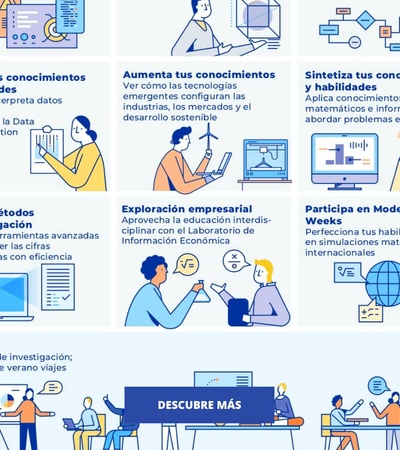Dual Degree in Economics & Applied Mathematics
Dual Degree in Economics & Applied Mathematics
Solve global challenges with economics and mathematics
- Home
- Studies
- Undergraduate Degrees
- Dual Degree In Economics & Applied Mathematics
A UNIQUE Dual Degree in Economics & Applied Mathematics
A UNIQUE Dual Degree in Economics & Applied Mathematics
The study plan for the Dual Degree in Economics & Applied Mathematics is designed to harness the combined power of two in-demand areas of expertise. The natural relationship between these two fields is underlined throughout the program and points of intersection will be studied in depth in order for you to apply your theoretical knowledge to tangible situations.
The plan will ensure you acquire a solid knowledge base in each individual discipline, as well as develop a deep understanding of the relationship between the two. Throughout the five-year program, you’ll have the chance to undertake a range of experiential learning opportunities including study-abroad programs, cultural immersion experiences, industry projects and more, allowing you to put your knowledge into practice and enhance your understanding of the concepts learned.

WANT TO KNOW MORE?
Dual Degree in Economics & Applied Mathematics Study Plan
Dual Degree in Economics & Applied Mathematics Study Plan
LEARN MORE ABOUT OUR Dual Degree in Economics & Applied Mathematics
LEARN MORE ABOUT OUR Dual Degree in Economics & Applied Mathematics
FIRST YEAR
The first year of the dual degree program will provide you with a solid foundation in both economics and mathematics. You will delve into core subjects such as Calculus, Linear Algebra, Discrete Mathematics and Computer Programming (including Programming for Economists), which will develop your mathematical thinking and computational skills. Simultaneously, you will explore the fundamentals of Microeconomics and Macroeconomics, as well as Economic History.
This interdisciplinary approach in the first year sets the stage for integrating mathematical reasoning with economic analysis throughout the later stages of the program, but also gives you insights into the functioning of different individuals, markets and economies as you develop your understanding of International Trade and Monetary Systems, and of what the numbers involved represent in Probability and Statistics.
SECOND YEAR
In your second year, you will expand your knowledge and skills across the two disciplines. You will study mathematics courses such as Geometry, Ordinary Differential Equations and Numerical Methods, and further explore the analysis and interpretation of economic data through subjects including Statistical Modeling, Databases and Data Visualization. Cutting-edge topics like Machine Learning, Industrial Organization and Strategy, Public Economics & Political Economy and the New Economy: Digital Ecosystems and Platforms module will better your understanding of the dynamics of economic systems in the digital era. You’ll also explore Research Methods, examine the tools that give you the power to understand what’s in the numbers you’ll encounter, and how to present them in Statistical and Mathematical Modeling modules, Databases and Data Visualization.
THIRD YEAR
The third year is designed to enhance your expertise in both economics and mathematics while exploring specialized areas and the effects of technology within the field. You will tackle subjects including Optimization and Numerical Linear Algebra, acquiring advanced mathematical techniques applicable to complex economic phenomena. Additionally, courses such as Corporate Finance, both Institutional and Labor Economics, Digitalization & AI, Financial Economics & Accounting, Blockchain & Cryptocurrency and Environmental Economics will provide you with broad insights into how both economic principles, sustainability considerations and emerging technologies shape industries, markets and sustainable development. This year also presents opportunities for entrepreneurial exploration, interdisciplinary collaboration and research through the Economic Reporting Lab.
FOURTH YEAR
Year four of the program encourages you to synthesize your knowledge and skills through more advanced courses. A deep dive into topics like Algorithms, Partial Differential Equations, Nonlinear Dynamics, Deep Learning and Bayesian statistics & stochastic processes will see you leverage your mathematical and computational expertise to address intricate economic problems. In parallel, you will explore wider economic subjects including Behavioral Economics, Finance & Decision Making—which seeks to address the complexities of human behavior, economic decision-making and the impact of technology on the economy—Capital Markets, Microeconometrics and different types of Economic Research.
FIFTH YEAR
The final year of the dual degree program places a greater focus on specialization and practical application. This year gives you the chance to choose elective courses that align with your individual interests and career aspirations, alongside the opportunity to complete an internship or to take part in an exchange. Moreover, you will undertake your Final and Capstone Projects—the pinnacle of your academic journey—showcasing your ability to apply mathematical and economic knowledge to address real-world challenges. This culminating experience ensures you are fully prepared to enter the workforce or pursue further studies having built a comprehensive understanding of economics and applied mathematics.
The Dual Degree in Economics & Applied Mathematics Learning Journey
The Dual Degree in Economics & Applied Mathematics Learning Journey
Your path to career success unveiled through our engaging infographic: Explore it to discover more about the program structure!
WATCH THIS PROBABILITY & MATH MASTERCLASS
WATCH THIS PROBABILITY & MATH MASTERCLASS
Join Rafif Srour's masterclass to explore numbers, logic, and randomness. Learn outcome prediction and real-world applications in mathematics. Unlock the mysteries of numbers!

BETTER CONNECTIONS
BETTER CONNECTIONS
Our agreement with the Royal Spanish Mathematical Society (Real Sociedad Matemática Española, RSME) validates the exceptional quality of our Bachelor in Economics and Applied Mathematics program, offering students valuable insights, opportunities, and connections with industry and academia, empowering their careers in the multidisciplinary world of applied mathematics.
Learning a new language can open up a world of new opportunities
Learning a new language can open up a world of new opportunities
IE University considers multiple language acquisition to be a key element of its educational model, leading to success in both work and study.
The Language Center at IEU is proud to offer students the possibility to study a wide range of languages, including French, German, Portuguese, Chinese, Arabic, Spanish, and English. With such a large variety of options, our students are able to personalize their academic path to meet their future career plans and objectives.

The Language Center at IEU
The Language Center at IEU
The Language Center helps students develop their multilingual communicative skills to help them flourish in the international labor market.
APPLICABLE REGULATIONS OF THE PROGRAM
APPLICABLE REGULATIONS OF THE PROGRAM








